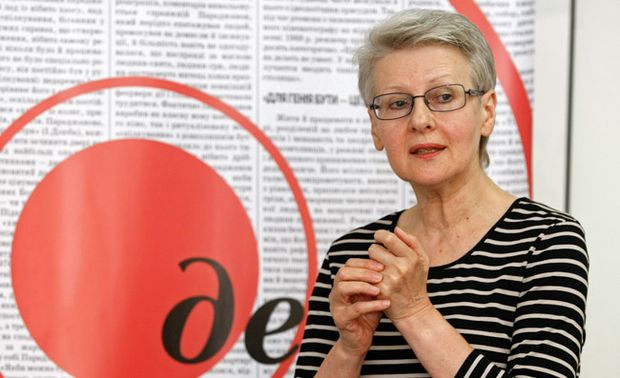Ironically, Ukraine has eliminated Russia in Russia itself!
Delirium tremens, tremens delirium...
My claim refers to what I see sitting in front of a TV screen and watching another Russian talk-show. While surfing channels, I see Solovyov, Kiselev, Nikonov, Norkin... accompanied already by some new and young people... All united in the delirious madness: “Junta,” “fascism,” “America is waging war against us in Ukraine.” They shout, sputter, shake... If you ask why I watch it all, my response is that I want to check if the temperature is falling in the hospital. No, the delirium tremens only intensifies...
Signally, the patients have kept shrieking after the Minsk II accords have been signed, with Putin talking of the coming ceasefire confidently, even if with his usual insincere smile. However, the Russian propaganda has kept fighting its war as if nothing has happened, clearly following the instructions to keep people in the same delusional state. Ukraine has completely replaced all Russian politics and even its imitation. The Russian politics and the Russian society are totally absent from the TV as well as other media and real life. The Ukrainian theme has swallowed everything. There is a certain irony to it: Ukraine has eliminated Russia in Russia itself!
Of course, there are painful questions we should ask: how badly is the society infected by the virus of hatred which they inject subcutaneously every day? How many people have escaped infection? What will happen to the rest when the infection goes away (will it ever, though?) and people will see the real life, which the media tried to distract them from by immersing them into an anti-Ukrainian drive? How will we live bearing responsibility, direct or indirect, for the blood spilt in Ukraine, both that of Ukrainians and that of our soldiers?
Here, I turn to my favorite articles from Den’s Library series. How many years have my good friend Larysa Ivshyna and her colleagues spent stubbornly and persistently trying to raise issues which many of us, the Russians, approached with confusion and even aversion at the outset: Why have we turned out so different? Who owns history which we in Russia see as our own? Why were the Ukrainians able to come together, stage protests (more than once) and stay there until the victorious end, and why we, the Russians, have not done so (yet?!) and do not know if we are going to be ever able to?
Had we managed to think about reasons for our differences earlier, say a decade ago, might not this terrible tragedy be averted?
The latest book answering the question “Why?”, Ukraine Incognita. TOP 25, which already includes articles written during the war, sees my Ukrainian friends attempting once again to explain to us Russians and their fellow Russian-speaking citizens of the Donbas the meanings of the Ukrainian history, Ukrainian traditions, and values for which people went to protest once and stand ready to do so again. Again, Ivshyna poses her eternal question that until recently seemed so strange to us in Russia: “How can Ukraine help Russia?!” We know the answer to it now: Ukraine’s fight for freedom is the best way to help Russia. Of course, we are not talking about the TV-screen Russia here. We are talking about another Russia, which has not yet found the drive and passionate energy it needs, but spring is coming, and we will see how we will meet it.
For those who want to understand why we are so different, my advice is to open Ukraine Incognita. TOP 25.
Lilia Shevtsova is a Russian political scientist, Doctor of Science in History, senior fellow at the Brookings Institution, the author of the foreword to Ukraine Incognita. TOP 25, part of Den’s Library series, published in Russian in 2014
Newspaper output №:
№11, (2015)Section
Day After Day





